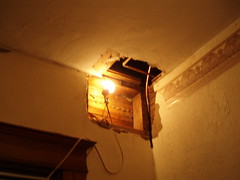We talked about slab leaks in last week’s post. The only thing that I can think of that could rival the frustration of  dealing with a slab leak, would be a sewer leak.
dealing with a slab leak, would be a sewer leak.
Sewer leaks are smelly, potentially dangerous, and somewhat difficult to detect and repair due to the nature of a sewer itself.
How do we know if the sewer is leaking?
When you call us out for a sewer clean-out because your plumbing is backing up into your home from a clogged sewer, we’ll use a rod to clean that line. If we draw mud back on the line from the sewer, we can be reasonably sure that there is a break in the sewer pipe somewhere.
At that point we don’t know how long it has actually been leaking! Sometimes it is one spot and one bad piece of pipe and sometimes it can be several sections of pipe that might be rotted out and leaking.
The plumber will put a sound down the sewer to the point of stoppage. The sound puts out a signal that we can track above the concrete or soil. That’s where we break the floor or dig the soil to repair. We then test…and check for any other breaks in the sewer.
If you have any questions about possible sewer leaks on your property, don’t let the fear of the costs associated with the leak repair stop you from calling us to get the urgent help that you need. It is far more costly to wait. What most people don’t realize is that the sewer in your home connects to the sewer in the street and when that break occurs in your home, you are connected to everything that gets flushed down that drain in the street. The possibility exists that any back up of the city sewer could back up into your home too! In addition, any uncontrolled water leaking into the soil beneath your home can cause foundation problems, especially with our N. Texas soils.
Contact us today for more information.
Photo Credit: ilovebutter on Flickr
 Spring is here and its time to take care of those projects around your home. While you may be able to easily deal with some issues, some projects are better left to a professional. Shower repair is one of those projects that is best when left to a licensed and reliable plumber.
Spring is here and its time to take care of those projects around your home. While you may be able to easily deal with some issues, some projects are better left to a professional. Shower repair is one of those projects that is best when left to a licensed and reliable plumber.
 Family-owned operations like ours have your best interest at heart. We’re not just out to fill quotas or pocketbooks with quick-fixes to see how many appointments we can manage in a day. Our strongest desire is to help you with your plumbing issues and add you to the list of clients that call us over and over because they know they’ll get personable and reliable service.
Family-owned operations like ours have your best interest at heart. We’re not just out to fill quotas or pocketbooks with quick-fixes to see how many appointments we can manage in a day. Our strongest desire is to help you with your plumbing issues and add you to the list of clients that call us over and over because they know they’ll get personable and reliable service. It’s a good domestic practice to regularly go around your house and make a mental note of the state of your faucets. Don’t forget the faucets that exist behind your washer and under the kitchen sink, connecting the dishwasher and refrigerator to the main water line.
It’s a good domestic practice to regularly go around your house and make a mental note of the state of your faucets. Don’t forget the faucets that exist behind your washer and under the kitchen sink, connecting the dishwasher and refrigerator to the main water line.

Recent Comments